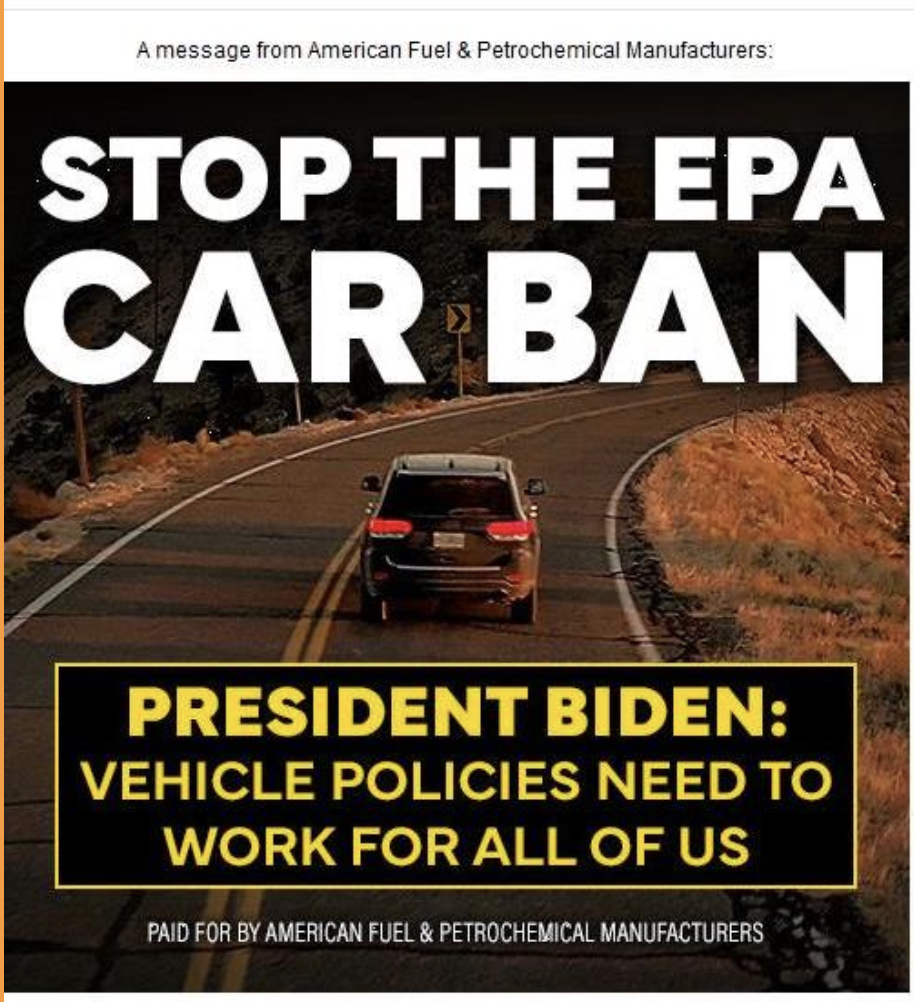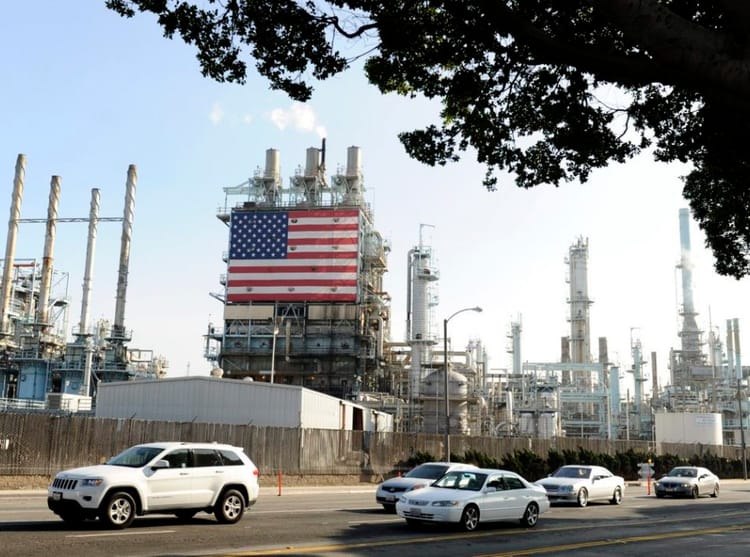The Atmosphere Doesn't Care About Your Feelings

I said this in an interview recently as a joke, but honestly I think we need to embrace this fact a bit more. On top of oil executives constantly telling us to "be reasonable," I see so many people celebrating political wins that don't deliver any actual emissions reductions...and don't get me wrong, I totally get why--so much blood, sweat and tears goes into those wins, and you gotta walk before you run, and also everyone needs to feel like they're winning sometimes or at least taking the first step towards winning. I really truly get all of that. The unfortunate reality is that the atmosphere does not. The atmosphere responds to molecules, and we either send it too many of the wrong molecules or we don't. The result of how those molecules change the atmosphere is that it becomes increasingly less livable or it doesn't. We're either putting less of the bad stuff up there or we're not. It's pretty black and white, the atmosphere. Not big on compromise.
So when I see things like the comment Meg O’Neill, former Exxon VP turned chief executive of Woodside Energy made at CERA Week, the annual global energy conference that was held in Houston last week, it seems absolutely ridiculous. "It has become emotional,” she said, of debates about climate policy. “And when things are emotional, it becomes more difficult to have a pragmatic conversation.”
Totally, Meg! Pragmatic like, just keep doing the same thing and hope the atmosphere magically behaves differently in a couple decades? Or like pretending that taking CO2 from smokestacks and injecting it under ground to get more oil out will somehow result in fewer carbon emissions? Or pragmatic like just under-reporting methane emissions 38-fold because what matters is whatever number you decide to put on a spreadsheet, not the actual molecules in the air?
For years a lot of the loudest voices in the climate movement went along with this thinking, too, terrified that if anyone veered away from charts and graphs they would only prove the oil executives right, that the people who thought we should act on what science was telling us were emotional weirdos, unlike them, the pragmatic adults in the room who would like to ignore the science, prioritize profits above all else, and pretend the atmosphere responds to reason and compromise and of course made-up numbers on spreadsheets. Climate folks would police each other on emotion, too. I wrote an essay as recently as 2019 as a reaction to being told not to "make things emotional" when I wondered on a climate list-serv if Democrats' obsession with "greening the military" was really the flex they thought it was (hola desde Costa Rica, home of the greenest military of all: no military). Even more recently, when climate justice advocates voiced their concern that the Inflation Reduction Act reinforced "sacrifice zone" thinking and bought into the idea that if you just match every new oil well with a windmill, that's climate progress (once again, not how the atmosphere works), they were told both publicly and privately to zip it. To not let their feelings get in the way of progress. To be a team player. As though the water they drink or the air they breathe would magically be cleaned by compromise.
Point being, as with most things, the accusation here, from O'Neill and her fellow oil executives, and sometimes from climate advocates too, is more of a confession. Whenever anyone says a plea for climate action is too emotional, that it's irrational or radical or not pragmatic, generally it is the speaker who has lost all touch with reality, who thinks their feelings and opinions have magically become new facts capable of bending the laws of physics and changing how the atmosphere has worked for thousands of years. In the face of clear science, isn't doing anything less than what the science tells us the most radical, irrational, emotional, not-at-all pragmatic move?
This Week on the Podcast: The U.S. Anti-Wind Movement, Explained
Passage of the Inflation Reduction Act in the U. S. has spurred a huge amount of investment and progress in the renewable energy space, not just in the U.S. but in other countries as well. Which in turn has driven a big uptick in anti-renewables activism, especially when it comes to offshore wind projects. In a lot of cases, the people showing up to fight wind farms, both on land and offshore, are the same people who were fighting them over a decade ago.
But there are some new groups too, and they're deploying some new tactics, especially around conservation and the idea that wind turbines are bad for birds and whales. There's no science backing up these claims, but that hasn't stopped them from taking hold. Still, it's a tricky situation. We're not just talking about fossil fuel backed resistance here.
The groups opposing these projects are not just astroturf groups. Some of them are real grassroots groups comprised of citizens who are genuinely concerned about, for example, the fate of the endangered right whale and how offshore wind farms might impact it. Or the fact that, in many cases, industrial-scale renewable projects are owned and operated by oil majors. That’s a particularly tough one because a lot of climate activists have been pushing oil majors to invest in renewables for years, but at the same time those companies have behaved in such bad faith that now a lot of environmentalists and climate advocates just don’t trust them. Many of those groups with legitimate concerns, though, are being co opted and weaponized by organizations that have spent the past 20 years working to block climate policy. They don’t really care about the whales so much as they do about blocking the energy transition away from fossil fuels.
It's complicated! Which is why a report out of Brown University late last year mapping the groups that are active on the east coast of the U. S. was especially helpful. That report is called “Against the Wind,” and it digs into the people and organizations who are actively fighting wind energy on the east coast of the U.S., which may sound niche but those folks are having an enormous influence on renewable energy projects across the country, and have even sparked some copycats in Australia. Longtime PR guy-turned-nuclear advocate Michael Shellenberger has been pushing the myth that offshore wind kills whales for longer than most. A short documentary he made, featuring interviews with members of a group called the Save Right Whales Coalition, which Shellenberger’s organization Environmental Progress helped to create, has been sited by multiple anti-wind groups, as well as rightwing media folks, in Australia as proof that the construction of offshore wind farms is harming whales. No peer-reviewed science has backed up this claim; marine scientists at the National Oceanic and Atmospheric Administration (NOAA) and elsewhere have conducted multiple studies and so far have found that fishing boats are the primary cause of whale deaths. Warming oceans aren’t helping much either.
The Brown report looks at how various anti-wind groups connect to each other, who's funding what, and which talking points seem to be spreading. To unpack it all, I talked to Isaac Slevin, the lead author on the report for this week's podcast episode:
This Week in Information Pollution
This week the Biden administration finalized the United States’ toughest limits on greenhouse gas emissions from passenger cars and light trucks, so naturally the American Fuel and Petrochemical Manufacturers and API front group Energy Citizens have launched campaigns decrying the emissions rules as a "gas car ban." AFPM claims to have invested "seven figures" in its campaign, which is targeted to the battleground states of Pennsylvania, Wisconsin, Michigan, Nevada, Arizona, Ohio and Montana. At CERA Week, API President Mike Sommers said the trade group would legally challenge the rule. Former president Donald Trump accused Biden of "killing the automotive industry," but the UAW and the Alliance for Automotive Innovation—a trade group whose members include Ford, General Motors, Stellantis and Toyota—applauded the rule. The rule is not a ban, but a requirement for reduced tailpipe emissions across automakers' entire fleets— cars, SUVs, vans and pickup trucks, but not 18-wheelers — from model years 2027 to 2032. The EPA expects the new rules to result in EVs accounting for up to 56% of new passenger vehicles sold for model years 2030 through 2032.


This Week's Climate Must-Reads
- Jerome Powell just revealed a hidden reason why inflation is staying high: The economy is increasingly uninsurable News about climate change increasingly making the world uninsurable has been piling up over the past year, but hearing the chairman of the Fed call the economy increasingly uninsurable hits different. “In the longer term, companies are withdrawing from writing insurance in some coastal areas,” Powell said, adding, “It’s a significant issue.” Relatedly, over at Grist, Jake Bittle has a story on Connecticut's move to penalize insurers for insuring fossil fuel projects.
- The World Is Warming Faster than Scientists Expected - It probably shouldn't feel like a big deal for any paper to write the truth. And yet it feels monumental that the FT's editorial board has written this piece. Perhaps the FT should also stop creating content for Aramco?
- Mainstream Climate Science: The New Denialism? I found this piece by writer Jonathon Porritt via the Climate & Capital newsletter and it's terrific. Porritt argues that by not calling attention to some of the incontrovertible facts of climate science—that the climate is now changing faster than (almost) all scientists thought possible, that the 1.5-degree goal has now slipped out of reach, that the backlash against this science is accelerating and will cause even more slow-down, and that the scientific institutions we've relied upon to do something (namely, the IPCC and COP) have been deeply compromised by the fossil fuel industry and failed us—"mainstream scientists are at risk of becoming the new climate deniers." A hot take and a worthy read!
- Chevron Will Pay Record Fines for California Oil Spills - The Desert Sun and ProPublica found that companies were profiting from illegal spills and that California’s oversight of the industry was lax. The result of their investigation was record-setting fines for the state's oil major.
- The MIT Methane Cover-up: An analysis of what the BBC exposed and PBS covered up Ed Carlevale is a former MIT employee who's been posting on LinkedIn over the past year or so about what he saw there with respect to fossil fuel-funded research. A few months back, Carlevale noticed some troubling discrepancies between the BBC and PBS versions of the doc series Big Oil vs The World, particularly around the role Ernest Moniz played in MIT's oil-backed research and the transformation of it into U.S. energy policy. He's captured all of them in this LinkedIn newsletter.





